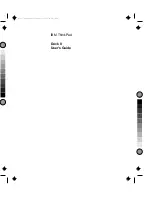
131
If Something Goes Wrong
Problems when you turn on the computer
Problems when you turn on the computer
These problems may occur when you turn on the power.
The computer will not start.
Make sure you attached the AC adaptor and power cord/cable
properly or installed a charged battery.
Press and hold the power button for at least 10 seconds.
If you are using the AC adaptor, check that the wall outlet is
working by plugging in another device, such as a lamp.
Verify that the computer is on by looking at the ON/OFF indicator.
If the indicator is glowing, the computer is on.
If you are using an AC adaptor, verify that the computer is receiving
power from the external power source by looking at the AC power
light. If the indicator is glowing, the computer is connected to a live
external power source.
The computer starts but when you press a key nothing
happens.
Verify that the active program accepts text input. Try clicking your
mouse on an area where you can type text and try typing again.
Your computer may be in Standby mode and have a software or
resource conflict. When this happens turning the power on returns
you to the problem instead of restarting the system. To clear the
condition, press
Ctrl
,
Alt
, and
Del
simultaneously.
Clearing the condition may get the computer running, but it will not
solve a resource conflict. Read the documentation that came with
the conflicting device and
“Resolving a hardware conflict” on
The computer is not accessing the internal storage drive or
the optional external diskette drive.
Your computer normally loads the operating system from the
internal storage drive. If you have an internal storage drive problem,
you will not be able to start the computer. Insert a system diskette
into the optional external diskette drive and press
F12
when the
machine starts and use the arrow keys to select the boot-up device.
The computer displays the
WARNING RESUME FAILURE
message.
The computer was placed in Standby mode and the battery has
discharged. Data stored in the computer’s memory has been lost.
Data stored in the computer’s internal storage drive may not be
affected.
















































